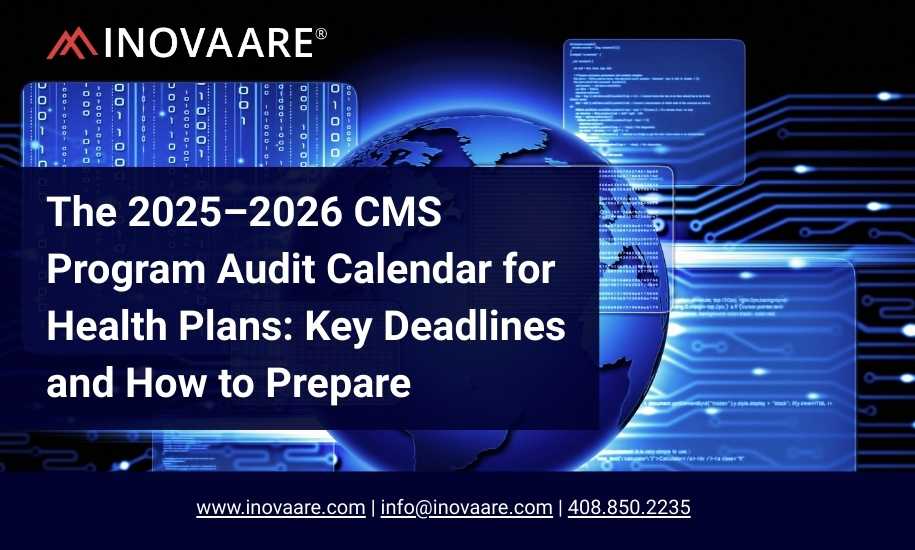The CMS Program Audit Calendar for Health Plans is more than a timeline; it’s a test of preparedness. CMS Program and Focus Audits are predictable in process but unforgiving in execution. Every year, a new round of health plans are notified, some expected it, many did not. For compliance, audit, and operational leaders, calendar blindness is no longer an excuse.
The real risk isn’t just failing an audit. It’s being unprepared when CMS comes knocking.
This blog unpacks the 2025 and 2026 CMS audit timeline, the key deadlines and deliverables, and how the most successful Medicare Advantage and Part D plans maintain continuous audit readiness.
What CMS audits are we talking about?
Here’s a breakdown of the major audit types CMS conducts annually:
| Audit Type | Purpose | Trigger |
|---|---|---|
| Program Audit | End-to-end review of CDAG, ODAG, SNP-MOC, CPE, FA | CMS-selected sample of plans |
| Focus Audit | Targeted deep dive into one area (e.g. A&G, Access) | Data, complaints, or prior findings |
| Validation Audit | Review of prior CAPs and remediation actions | Post-ICAR or Conditions |
| Risk Adjustment Data Validation (RADV) | Ensures accurate coding and reimbursement | Mandatory for all plans |
These audits don’t just evaluate systems, they scrutinize documentation, delegation oversight, and data quality across your organization.
The CMS audit timeline – 2025 and 2026 (expected)
While CMS doesn’t publish a public calendar in advance, historical patterns allow us to reasonably project timelines.
2025 Audit Cycle
- January–February 2025: CMS refines audit strategy, reviews prior year trends
- April 2025: Program Audit notices began rolling out via HPMS
- April–May 2025: Universe file submission deadlines (15 business days from notice)
- May–July 2025: Remote audit fieldwork began; document pulls, interviews
- August–October 2025: ICARs, CAPs, and Conditions issued
- Q4 2025: Data Validation audits, performance monitoring, CAP reviews
2026 Audit Cycle (based on rolling update trends)
- Likely to follow a similar cadence unless CMS adopts a new enforcement pattern
- More Focus Audits and targeted oversight expected due to CMS’ shift toward real-time monitoring and complaint-driven reviews
Bookmark this: CMS Audit Resources – CMS Program Audit Overview
Deadlines and deliverables health plans must track
| Audit Phase | What CMS expects | Timeframe |
|---|---|---|
| Audit Notification | Response acknowledgement | Within 2 business days |
| Universe File Submission | 5–7 files across CDAG, ODAG, SNP, CPE, FA | Within 15 business days |
| Document Requests | Cases, call logs, P&Ps, screenshots | Ongoing during fieldwork |
| ICAR Response | Root cause, remediation plan, evidence | Typically 3 business days |
| CAP Submission | Final corrective plan with ownership | CMS-defined |
| Validation Audit Prep | Evidence of sustained fix | As scheduled |
Why most plans scramble (and how to avoid it)
Here’s the reality for many compliance and audit leaders:
- Universe files are generated manually, and scrubbed at the last minute
- Documentation is scattered across departments and delegates
- No real-time audit dashboard exists until the notice arrives
- CAPs are reactive, and lessons learned never institutionalized
“Audit prep starts 90 days before CMS knocks. Readiness starts 9 months before that.”
VP of Compliance
National Medicare Advantage Plan
Building year-round readiness isn’t optional, it’s strategic
- Automate universe generation and scrubbing: Don’t wait until audit notice day to find out your files won’t pass CMS logic.
- Use dashboards with role-based audit views: Know exactly where you stand on CAPs, delegated oversight, and open ICARs.
- Institutionalize mock audits: Simulate audit logic and documentation pulls quarterly, not just when CMS appears.
- Map CAPs to root cause themes: Track recurring issues across years, vendors, or departments.
- Ensure every audit artifact is version-controlled and time-stamped: What you can’t trace, you can’t defend.
For 2025 and 2026, leadership must own audit orchestration
Audit is no longer just a regulatory fire drill; it’s a reputational and operational pressure test. Plans that embed audit prep into their operations, from data generation to policy documentation, are the ones who:
- Avoid ICARs and Conditions
- Move up in Star Ratings
- Maintain contract stability
- Avoid audit-induced chaos every March
How Inovaare helps health plans stay audit-ready
Audit readiness isn’t a project; it’s an operating model. Inovaare helps health plans shift from reactive prep to proactive confidence by bringing every piece of audit infrastructure onto one connected platform.
Whether you’re facing a Program Audit, Focus Audit, RADV, or a data validation review, Inovaare equips your team with:
- CMS-aligned universe generators and scrubbers to ensure clean, submission-ready data
- Mock audit simulators with CMS logic baked in, so there are no surprises when the real notice arrives
- CAP and ICAR lifecycle tracking that gives you full visibility into issue resolution and accountability
- AI-powered automated summarized findings, pre-filled responses, and identifiable repeat risks
- Real-time dashboards that show exactly where you stand, across internal audits, delegated entities, and CMS deliverables
- Secure delegate portals to bring FDRs into your audit ecosystem, without compromising control
With Inovaare, you’re not just meeting deadlines, you’re strengthening your audit posture with every submission, every workflow, and every system update. Explore the full suite
CMS Program Audit Prep Calendar (2025–26)
Expanded CMS Audit & Oversight Calendar
Author
Amy Cornett
VP Compliance, Inovaare
